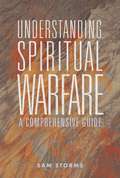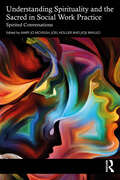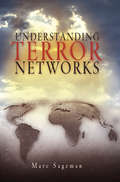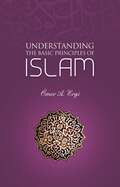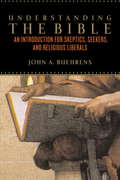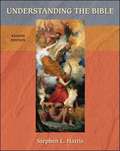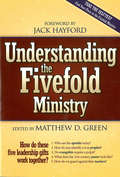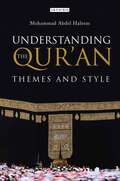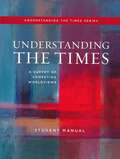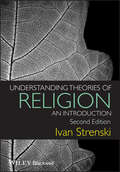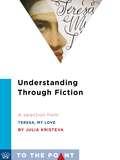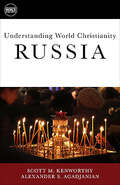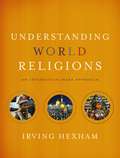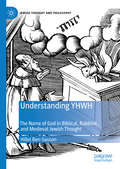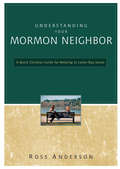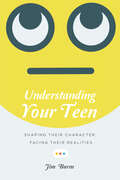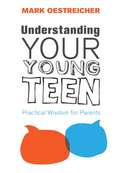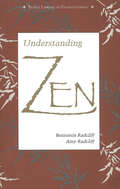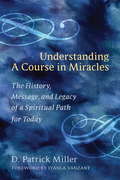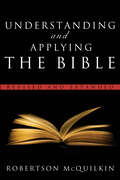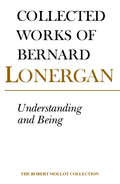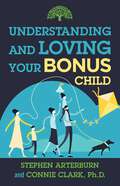- Table View
- List View
Understanding Spiritual Warfare: A Comprehensive Guide
by Sam StormsA comprehensive, theological guide to everything the Bible has to say about spiritual warfare.Many Christians today are unaware or skeptical of the reality of Satan and the role he and his demonic hordes seek to exert on our lives. But if we're to take Scripture seriously, we can't overlook the biblical assertions about the spiritual battles between the kingdom of God and the kingdom of the devil.The truth is that believers in Jesus are certain to encounter men and women of all ages who are oppressed, tormented, and tempted by demonic powers. In Understanding Spiritual Warfare, theologian and professor Sam Storms confronts the reality of the spiritual conflict in our midst, the threat of the demonic, and how we, as Christians, can respond to such a threat in our own lives and in the lives of others.Storms explains the biblical teaching on spiritual warfare and shares numerous personal accounts of victories over the demonic, answering question like:Who is Satan and his demons, and how do they act?Can a Christian be demonized?How does the authority of Christ defeat the devil and the demonic?What is &“warfare prayer&” and how can we wield it?Perfect for any individual or group who wants to grow in their understanding of spiritual warfare, Understanding Spiritual Warfare also serves as a training manual for a ministry of deliverance and inner healing.
Understanding Spirituality and the Sacred in Social Work Practice: Spirited Conversations
by Jioji Ravulo Joel Hollier Mary Jo McVeighSocial work is constantly epistemically evolving and embracing diverse bodies of knowledge to inform its ontology and practice frameworks.Over the years, the impact of feminist, post-colonial, and queer theory, for example, has broadened the social work lens and invited a welcome departure from dominant Westernised, patriarchal, and positivist paradigms. However, the separation of the spiritual realm from casework, clinical, community, and group work traditions of social work remained steadfast. The last decade or so has seen forages into the issues of social work and spirituality. This examination into spirituality and social work has shown that for many service users, spiritual practices (be they religious or non-religious) are important in their lives and their way out of difficulties. Concurrently, relationships between socio-political movements and global religions have grown increasingly complex. To create a truly holistic approach to the needs of service users it is important that social work policy and practice give voice to these complexities and understand the place of spirituality within service delivery. This book critically reflects upon and discusses the intersecting role of spirituality in the lives of people who access social work services.By gathering contributions from people with lived experience, practitioners, and academics, this book will explore a comprehensive range of issues, opening the area of spirituality to current critical, socio-political, and cultural thought. It will be of interest to all social work scholars, students, and practitioners.
Understanding Terror Networks
by Marc SagemanFor decades, a new type of terrorism has been quietly gathering ranks in the world. America's ability to remain oblivious to these new movements ended on September 11, 2001. The Islamist fanatics in the global Salafi jihad (the violent, revivalist social movement of which al Qaeda is a part) target the West, but their operations mercilessly slaughter thousands of people of all races and religions throughout the world. Marc Sageman challenges conventional wisdom about terrorism, observing that the key to mounting an effective defense against future attacks is a thorough understanding of the networks that allow these new terrorists to proliferate. Based on intensive study of biographical data on 172 participants in the jihad,Understanding Terror Networksgives us the first social explanation of the global wave of activity. Sageman traces its roots in Egypt, gestation in Afghanistan during the Soviet-Afghan war, exile in the Sudan, and growth of branches worldwide, including detailed accounts of life within the Hamburg and Montreal cells that planned attacks on the United States. U. S. government strategies to combat the jihad are based on the traditional reasons an individual was thought to turn to terrorism: poverty, trauma, madness, and ignorance. Sageman refutes all these notions, showing that, for the vast majority of the mujahedin, social bonds predated ideological commitment, and it was these social networks that inspired alienated young Muslims to join the jihad. These men, isolated from the rest of society, were transformed into fanatics yearning for martyrdom and eager to kill. The tight bonds of family and friendship, paradoxically enhanced by the tenuous links between the cell groups (making it difficult for authorities to trace connections), contributed to the jihad movement's flexibility and longevity. And although Sageman's systematic analysis highlights the crucial role the networks played in the terrorists' success, he states unequivocally that the level of commitment and choice to embrace violence were entirely their own. Understanding Terror Networkscombines Sageman's scrutiny of sources, personal acquaintance with Islamic fundamentalists, deep appreciation of history, and effective application of network theory, modeling, and forensic psychology. Sageman's unique research allows him to go beyond available academic studies, which are light on facts, and journalistic narratives, which are devoid of theory. The result is a profound contribution to our understanding of the perpetrators of 9/11 that has practical implications for the war on terror.
Understanding The Basic Principles of Islam
by Omer A. ErgiThis book describes and explains the meaning of the essential articles of faith and basic forms of worship in Islam. The narration is enriched with relevant essays from prominent scholars. in addition to the answers given to the frequently asked questions, the author uses different allegories and metaphors in order to clarify his points. Perfect for young readers, the book presents the basic framework of understanding and reasoning of the Islamic faith.
Understanding The Bible
by John BuehrensA thoughtful, warm, and witty introduction Understanding the Bibleis designed to help empower skeptics, seekers, nonbelievers, and those of a liberal and progressive outlook to reclaim the Bible from literalists. In making accessible some of the best contemporary historical, literary, political, and feminist readings of the Hebrew and Christian scriptures, it encourages all who would find in the biblical heritage an ally and not an enemy in the quest for a more just and humane world. Brief and to the point, it can easily be used to stimulate group discussions and personal reading of the biblical texts themselves, and is an excellent introduction to the Judeo-Christian tradition for those of other faiths.Understanding the Bible includes four preliminary chapters on the why, who, which, and how of biblical understanding, followed by eight brief thematic chapters covering the core of the Hebrew Bible and six covering the Christian scriptures, plus chronologies, maps, and helpful suggestions for further reading.
Understanding The Bible (Eighth Edition)
by Stephen L. HarrisThis best-selling nonsectarian guide is designed for students undertaking their first systematic study of the Bible. Placing each book of the Old Testament, Apocrypha, and the New Testament fully in its historical and cultural context, Understanding the Bible acquaints readers with the content as well as the major themes of each biblical book, and familiarizes them with the goals and methods of important scholarship.
Understanding The Fivefold Ministry: How do these five leadership gifts work together
by Jack Hayford Matthew D. GreenThe ministry gifts are alive and well today! When Jesus ascended to heaven, He left gifts behind: apostles, prophets, evangelists, pastors, and teachers. But their operation has often been surrounded by neglect, confusion, and outright controversy. Jack Hayford, Cindy Jacobs, Reinhard Bonnke, C. Peter Wagner, Fuchsia Pickett, Tommy Barnett, and many others combine decades of experience, reflection, and biblical study to uncover the true purpose for the fivefold ministry. Find answers to these questions regarding the release and shepherding of the fivefold minstry: •Who are the modern-day apostles, and why does the church still need them? •What are the marks of an authentic prophet, and how should we judge prophecy? •How do you know if you're called to be an evangelist, and what's the most effective method for leading an unbeliever to Christ? •Why are teachers so influential, and how do we discern false doctrine? •What is the role of the pastor in the twenty-first century, and how is it changing? •How do the five ministry gifts cooperate in thelocal church, and who's in charge when all five are active?God is building His body around the world in the most unexpected ways through the most unexpected people. Take a self-test to find out where your gifts lie and what area of ministry God may have custom-designed you for.
Understanding The Qur'an: Themes And Style (London Qur'an Studies)
by M. A. S. Abdel Haleem Muhammad Abdel HaleemThe tenets of Islam cannot be grasped without a proper understanding of the Qur'an. In this important new introduction, Muhammad Haleem examines its recurrent themes - life and eternity, marriage and divorce, peace and war, water and nourishment - and for the first time sets these in the context of the Qur'an's linguistic style. Professor Haleem examines the background to the development of the surahs (chapters) and the ayahs (verses) and the construction of the Qur'an itself. He shows that popular conceptions of Islamic attitudes to women, marriage and divorce, war and society, differ radically from the true teachings of the Qur'an.
Understanding The Scriptures (Semester Edition)
by Scott HahnPart of the Didache series. Presenting a Catholic approach to Scripture and highlighting the theme of covenant, Understanding the Scriptures: Semester Edition will provide an understanding of Sacred Scripture so critical to the Catholic Faith.
Understanding The Times Student Manual
by David Noebel Jeff Myers Amanda Bridger Stephen Sutherland Katelyn BrantleyThe Understanding the Times Student Manual provides the student work to be completed alongside the book Understanding The Times: A Survey of Competing Worldviews (not-included and sold-separately). Each chapter includes learning objectives, discussion questions, a reading selection from an original work or author discussed in that chapter, reading selection discussion questions, a link to watch a video online, a fill-in-the-blank video outline, video discussion questions, chapter key points, and a final chapter assignment. A syllabus at the beginning of the book organizes assignments by weeks and days for easy scheduling. 36 weeks of assignments (5 days per week) are included. 365 pages, softcover. Consumable and non-reproducible. Scripture taken from the ESV.
Understanding Theories of Religion: An Introduction
by Ivan StrenskiFeaturing comprehensive updates and additions, the second edition of Understanding Theories of Religion explores the development of major theories of religion through the works of classic and contemporary figures. • A new edition of this introductory text exploring the core methods and theorists in religion, spanning the sixteenth-century through to the latest theoretical trends • Features an entirely new section covering religion and postmodernism; race, sex, and gender; and religion and postcolonialism • Examines the development of religious theories through the work of classic and contemporary figures from the history of anthropology, sociology, psychology, philosophy, and theology • Reveals how the study of religion evolved in response to great cultural conflicts and major historical events • Student-friendly features include chapter introductions and summaries, biographical vignettes, a timeline, a glossary, and many other learning aids
Understanding Through Fiction: A Selection from Teresa, My Love: An Imagined Life of the Saint of Avila (To the Point)
by Julia KristevaBorn in 1515, Teresa of Avila survived the Spanish Inquisition and was a key reformer of the Carmelite Order. Her experience of ecstasy, which she intimately described in her writings, released her from her body and led to a complete realization of her consciousness, a state Julia Kristeva explores as it was expressed in Teresa's writing. Incorporating notes from her own psychoanalytic practice, as well as literary and philosophical references, Kristeva builds a fascinating dual diagnosis of contemporary society and the individual psyche while sharing unprecedented insights into her own character. Through her dazzlingly varied formats Kristeva tests the borderlines of atheism and the need for faith, feminism and the need for a benign patriarchy.
Understanding World Christianity: Russia (Understanding World Christianity Ser. #5)
by Scott M. KenworthyUnderstanding World Christianity: Russia is a broad examination of Christianity--especially Orthodox Christianity--in modern Russia. The Russian Orthodox Church is currently playing a very prominent role in Russian society and politics, and it is not possible to fully understand Russia today without it. The role of Russian Orthodoxy today is a dramatic reversal from the suppression it suffered for most of the 20th century under the Soviet regime. Based upon a wealth of recent research in multiple fields, this book examines the complexity of contemporary Russian Orthodoxy within a historical context. It first introduces the reader to what is distinctive about Orthodox Christianity in general and Russian Orthodoxy in particular, then provides an overview of the history of Christianity in Russia, its various regional expressions, the experience of representative individuals during the 20th century, an examination of modern Russian theology, and ends with an analysis of the post-Soviet relationship of religion, politics, and society. It is an ideal introduction for students and non-specialists interested in Global Christianity, Orthodox Christianity, Russian Studies, and any others who wish to know how Christianity influences, and is influenced by, the Russian context.
Understanding World Religions: An Interdisciplinary Approach
by Irving HexhamGlobalization and high-speed communication put twenty-first century people in contact with adherents to a wide variety of world religions, but usually, valuable knowledge of these other traditions is limited at best. On the one hand, religious stereotypes abound, hampering a serious exploration of unfamiliar philosophies and practices. On the other hand, the popular idea that all religions lead to the same God or the same moral life fails to account for the distinctive origins and radically different teachings found across the world’s many religions. Understanding World Religions presents religion as a complex and intriguing matrix of history, philosophy, culture, beliefs, and practices. Hexham believes that a certain degree of objectivity and critique is inherent in the study of religion, and he guides readers in responsible ways of carrying this out. Of particular importance is Hexham’s decision to explore African religions, which have frequently been absent from major religion texts. He surveys these in addition to varieties of Hinduism, Buddhism, Judaism, Christianity, and Islam.
Understanding YHWH: The Name of God in Biblical, Rabbinic, and Medieval Jewish Thought (Jewish Thought and Philosophy)
by Hillel Ben-SassonThis book unlocks the Jewish theology of YHWH in three central stages of Jewish thought: the Hebrew bible, rabbinic literature, and medieval philosophy and mysticism. Providing a single conceptual key adapted from the philosophical debate on proper names, the book paints a dynamic picture of YHWH’s meanings over a spectrum of periods and genres, portraying an evolving interaction between two theological motivations: the wish to speak about God and the wish to speak to Him. Through this investigation, the book shows how Jews interpreted God's name in attempt to map the human-God relation, and to determine the measure of possibility for believers to realize a divine presence in their midst, through language.
Understanding Your Mormon Neighbor: A Quick Christian Guide for Relating to Latter-day Saints
by Ross AndersonIn Understanding Your Mormon Neighbor, Ross Anderson seeks to help Christians relate to Latter-day Saints by giving insights into Mormon life and culture. Anderson’s work is supported both by his lifetime of experiences growing up Mormon and by current research that utilizes many Latter-day Saints’ own sources. This book explains core stories that form the Mormon worldview, experiences that shape the community identity of Mormonism, and how Mormons understand truth. Anderson shares how most Mormons see themselves and others around them, illuminating why people join the LDS Church and why many eventually leave. Latter-day Saints will find the descriptions of their values, practices, and experiences both credible and familiar. Understanding Your Mormon Neighbor suggests how Christians can befriend Latter-day Saints with confidence and sensitivity and share the grace of God wisely within their relationships. Anderson includes discussion questions for individuals and small groups, black and white photographs and charts, and an appendix that includes “Are Mormons Christians?” and “Should I Vote for a Mormon?”
Understanding Your Teen: Shaping Their Character, Facing Their Realities
by Jim BurnsParenting teenagers is one of the biggest challenges parents face. New realities make becoming independent more difficult. Teens are traveling a different road and are moving at a different pace than those of previous generations. Today's cultural environment is more complicated and confusing than ever. But fear not! Family expert Jim Burns provides a handy guide for parenting teens. For teens to become responsible adults, parents need to help them grow through developmental changes to attain a healthy self-identity, establish good relationships, make wise decisions, and grow in their relationship with God. Burns shows how parents can shape behavior and character, navigate social media challenges, and communicate and resolve conflict healthily. He also tackles the realities of our day, including cyberbullying, dating violence, self-injury, depression, and much more. Whether you're facing serious troubles or looking for simple tips for a better family life, this book offers help and hope.
Understanding Your Young Teen: Practical Wisdom for Parents
by Mark OestreicherUnderstanding Your Young Teen is a book on early adolescent development for parents of young teens and pre-teens. Parents of young teens will 1. Gain an understanding of the unique and not-always-obvious realities of early adolescent development. This new understanding can greatly enhance parents’ patience, parenting approaches, and relationship with their child. 2. Review the developmental uniquenesses of the young teen years. Most parents don’t fully appreciate the changes that are taking place in their teens bodies, minds and relationships. This resource will give them a solid understanding of those areas. 3. Explore new research and cultural changes. Parents will get a better understanding of the changing landscape of teen culture and see how much as changed since they were young teens. The bulk of the book will be based on the first half of: Middle School Ministry. The developmental chapters will be re-written for parents, and will not only include the developmental issues themselves, but the practical implications for parenting and living with young teens. A strong pro-young teen bias will permeate the book, as my affection for young teens and conviction that this age is a great opportunity for faith formation will be woven through all chapters. While the book will be based on research and experience, the tone will be conversational, from one parent of young teens to others. First-person tense will be used throughout, along with examples from my family and extensive involvement with young teens.
Understanding Zen
by Benjamin Radcliff Amy Radcliff"The authors of this book, who both have university affiliations, present Zen as a "secular doctrine without any necessary relationship to Buddhism or Eastern culture." Some of the seven chapters deal with such concepts as reason, paradox, meaning, and existence and how they relate to Zen. Others explore successfully the origin of Zen, the practice of meditation, and the social implications of Zen. The authors also investigate the Taoist and Buddhist ideas preceding Zen and relate it to Freudian psychology, anarchism, and the dualistic truths of the scientific method. Though this well-done study is accessible to informed lay readers, it is more suitable for academic libraries."--Library Journal
Understanding Zen
by Benjamin Radcliff Amy Radcliff"The authors of this book, who both have university affiliations, present Zen as a "secular doctrine without any necessary relationship to Buddhism or Eastern culture." Some of the seven chapters deal with such concepts as reason, paradox, meaning, and existence and how they relate to Zen. Others explore successfully the origin of Zen, the practice of meditation, and the social implications of Zen. The authors also investigate the Taoist and Buddhist ideas preceding Zen and relate it to Freudian psychology, anarchism, and the dualistic truths of the scientific method. Though this well-done study is accessible to informed lay readers, it is more suitable for academic libraries."--Library Journal
Understanding a Course in Miracles
by Iyanla Vanzant D. Patrick MillerThis comprehensive introduction to the grassroots phenomenon A Course in Miracles covers the book's role in America's changing spiritual landscape, investigates its origins and history, and explains its principal tenets and philosophies. Weaving together extensive research and student perspectives, journalist D. Patrick Miller sheds light on the provocative and oft-misunderstood text. An examination of the teachings and influence of A Course in Miracles, one of the most popular and controversial texts in contemporary spirituality. With a new foreword by Iyanla VanzantCovers common questions, such as What exactly is the Course? Is it Christian, Buddhist, New Age, or something else entirely? How did the author channel the message? More than two million copies of A Course in Miracles available worldwide in 19 languages, with thousands of study groups devoted to it. From the Trade Paperback edition.
Understanding and Applying the Bible: Revised and Expanded
by Robertson McQuilkinWhy do even the sincerest students of God's Word sometimes find it dry or confusing? Too often, Robertson McQuilkin suggest, it's because they don't know how to read it.In his classic introduction to Bible study, McQuilkin shows everyday believers how to navigate the Bible's genres and plumb its thought structures with accuracy, experiencing afresh living encounters with the inspired Word.Newly revised and updated, Understanding and Applying the Bible also examines the most common errors in Bible reading. In the end, McQuilkin maintains Scripture can be understood by anyone, simply by following a set of straightforward and time-tested principles.
Understanding and Applying the Bible: Revised and Expanded
by Robertson McQuilkinWhy do even the sincerest students of God's Word sometimes find it dry or confusing? Too often, Robertson McQuilkin suggest, it's because they don't know how to read it.In his classic introduction to Bible study, McQuilkin shows everyday believers how to navigate the Bible's genres and plumb its thought structures with accuracy, experiencing afresh living encounters with the inspired Word.Newly revised and updated, Understanding and Applying the Bible also examines the most common errors in Bible reading. In the end, McQuilkin maintains Scripture can be understood by anyone, simply by following a set of straightforward and time-tested principles.
Understanding and Being: The Halifax Lectures on Insight, Volume 5
by Bernard Lonergan Elizabeth Morelli Mark MorelliBernard Lonergan (1904-1984) was a noted Canadian philosopher and theologian. He devoted his life to articulating a generalized method of inquiry and its implications, not only for the human and natural sciences, but also for a better world and a higher quality of human life. His own clear vision showed him the need to overcome the terrible fragmentation of knowledge and life in our time. The struggle to achieve an integrated view is the theme that unified the body of his work. In the history of that struggle, Understanding and Being plays a central role. Published a year after his profound and complex Insight, it is the edited transcription of some thirty hours of Lonergan's lectures on that seminal book. Understanding and Being serves as a guide to the very challenging terrain of Insight, or, as one commentator put it, if Insight is the Everest in the range of Lonergan's works, Understanding and Being is the approach through rolling foothills. This edition, the second, incorporates more of the historical setting in the text and adds a wealth of explanatory notes, as well as previously unedited discussions that followed the lectures.
Understanding and Loving Your Bonus Child
by Stephen Arterburn Ph.D. Connie ClarkTwenty-first century how-to advice embracing and celebrating the nonbiological parent and his or her "bonus" children, from the author of the internationally best-selling Understanding Your Child series, and host of New Life Live!, the nation's number one Christian call-in counseling show.Most of the parenting books currently in circulation were written decades ago. Therefore, they do not address—nor could they address—all the issues parents face today in the era of technology and excess. Parents do not need another article that contradicts the last one they read; rather, they need insights, techniques, and strategies to tackle the pressing issues of twenty-first-century parenting. That&’s what the Understanding and Loving Your Child series of books will do. Understanding and Loving Your Bonus Child takes a look at a very familiar family dynamic. Not being the biological parent to your spouse&’s child doesn&’t mean you don&’t have a voice. This book helps celebrate the role of a bonus parent in a child&’s life.
